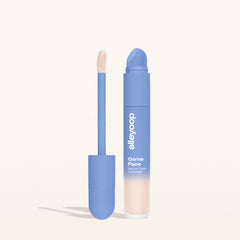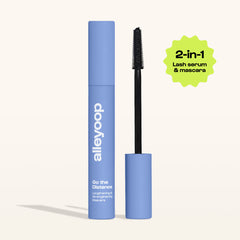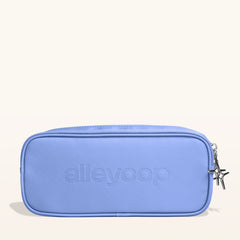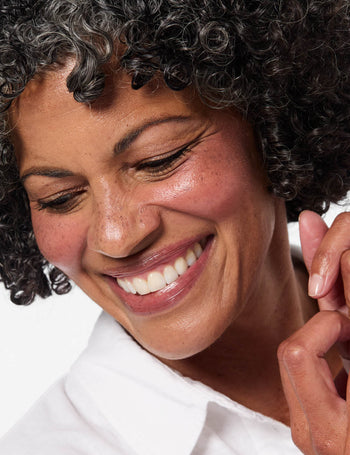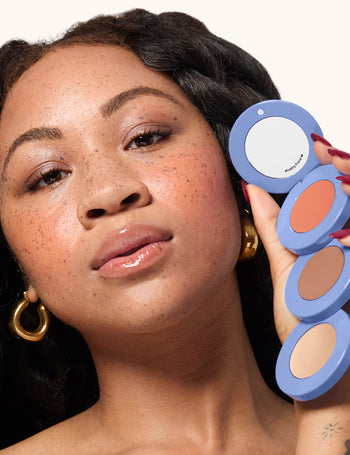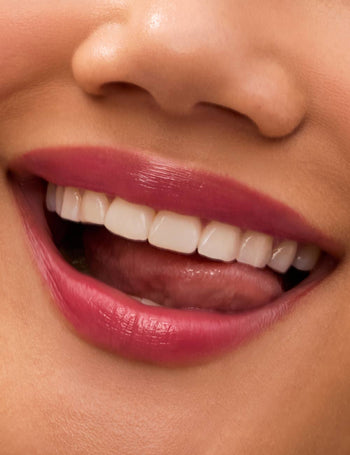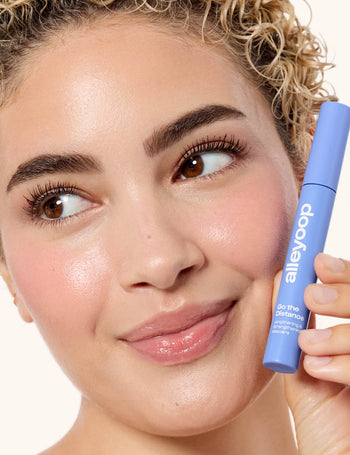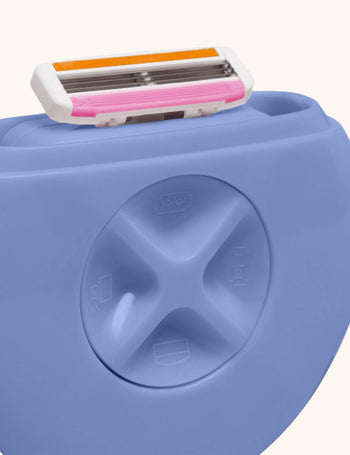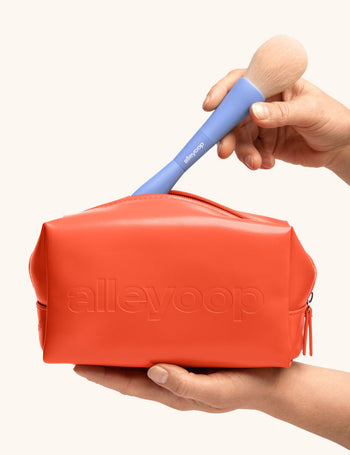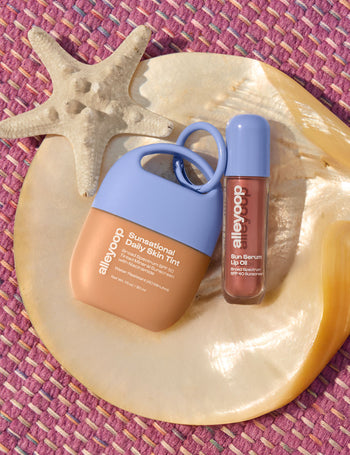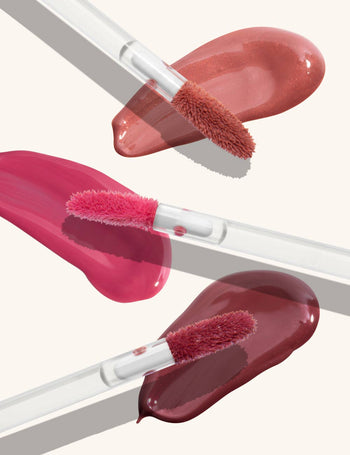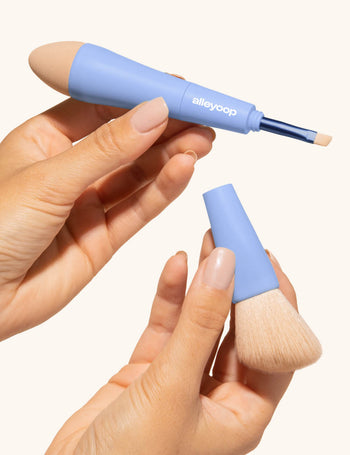Over-Exfoliated Skin: Six Treatment Options
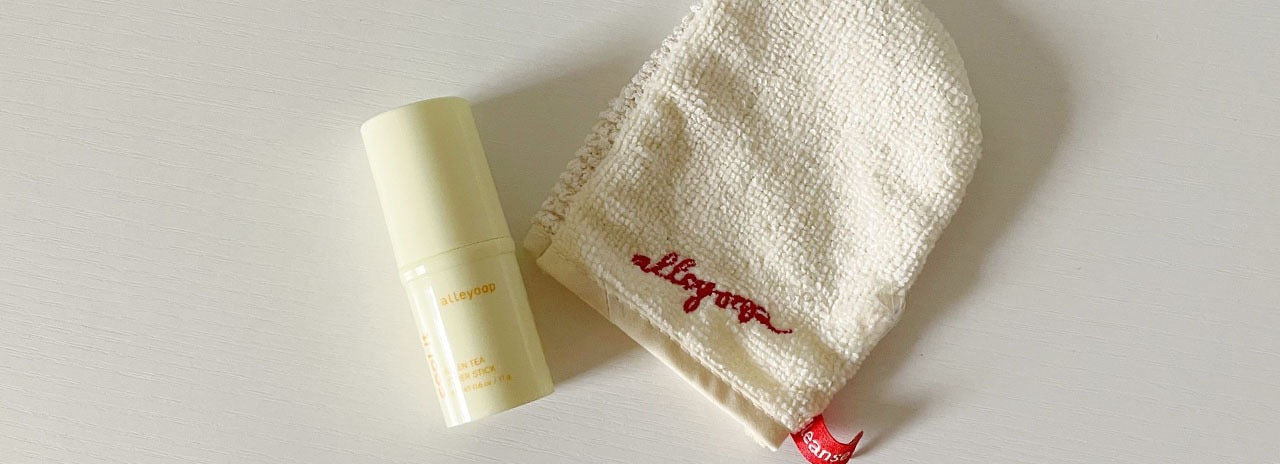
Exfoliation is an excellent step in your skincare routine. It helps us remove the accumulation of dead skin cells and helps keep our skin hydrated, smooth, and fresh. When used correctly in our beauty routine, exfoliation can help reveal our healthy, youthful skin underneath all your layers of makeup residue and dead skin.
However, it is easy for us to get over ambitious with our exfoliating routine because we feel refreshed. Over-exfoliated skin can lead to redness, swelling, and redness, among other common signs.
Not to mention, over-exfoliation can be just as unhealthy for our skin as exfoliation is healthy. But don’t worry! Our team at Alleyoop has put together the top five treatment options for over-exfoliated skin.
Let’s break down what exfoliation is and some common signs you may be over-exfoliating!
What Is Exfoliation?
First, let’s recap what exfoliation is before we move on.
If you started your daily skincare routine in the late ‘90s or later, you’re probably familiar with exfoliation and our obsession with wanting the smoothest, freshest skin possible. Over the last few years, our options for removing dead skin cells have been endless.
Every day we have millions of skin cells dying, making room for new skin cells. Unfortunately, we also come in contact with germs, bacteria, environmental pollutants, and makeup and skincare residue throughout our day.
We need exfoliation to help our skin shed the outer layer of congestion that will cause our pores and the overall health of our skin to suffer. However, a little exfoliation goes a long way.
Keep in mind that we can contribute to skin damage if we start scrubbing too harshly or using too many variations of the same product too many times in a row. Over-exfoliation can frequently sneak up before we realize it, but there are several common signs to keep an eye out for if we exfoliate often.
What Are the Signs of Over-Exfoliation?
Over-exfoliation is common and can happen to any of us. However, knowing the signs ahead of time will make it easier to spot over-exfoliation before any lasting damage to your skin’s natural layer of protection from the elements such as UV rays, pollutants, and bacteria.
If you are exfoliating more than twice a week or have sensitive skin, then you may need to keep an eye out for the common signs of over-exfoliation.
The good news is it’s typically easy to tell if you’re over-exfoliating your skin!
Over-exfoliation essentially removes the healthy layer of skin underneath the dead skin cells, making your face susceptible to redness and irritation even when applying the daily products that have never bothered you before.
The most common signs of over-exfoliation include:
- Redness or Irritation
- Facial discomfort when touched
- Flaky or peeling skin
- Tenderness
- Breakouts, especially rough pimples
- Burning
- Tightness and stinging
- Dryness and itchiness
- Sensitivity to other skincare products
You may develop a slight rash or dry patches over time and one or more common signs. For example, you may have noticed some redness after exfoliating, but it leaves somewhat quickly.
A telltale sign of over-exfoliation is when the redness stays on your skin for an extended amount of time. For example, your skin may maintain redness for several days after exfoliating. Still, if the redness stays for several days, it may be a sign that you have over-exfoliated skin.
Furthermore, if you have pre-existing skin concerns such as psoriasis, eczema, or acne, over-exfoliation can lead to flare-ups or additional irritation. If you’ve noticed your usual skin treatment isn’t working, you may be over-exfoliating.
Aggressively scrubbing and exfoliating can also make your skin extra sensitive and can even potentially lead to rashes. If your skin starts looking and feeling irritated, and you haven’t done anything else new or different to your skincare routine, there’s a good chance you’re over-exfoliating.
Let’s explore treatment options and determine which one is right for you!
Six Treatment Options if You Have Over-Exfoliated Skin
If you think your skin is over-exfoliated – or still not sure what’s going on but want to find out –the first thing you should always do is stop exfoliating. Allow your skin to rest and heal without adding harsh scrubs or exfoliants to your already irritated skin.
Suppose you’re experiencing burning and irritation after exfoliating. In that case, a great way to calm the skin and ease the discomfort is to immediately rinse your face in cool water and apply a cool (not ice cubes directly!) compress to the affected area.
If you have aloe vera, it will also help soothe and calm any burning or tightness you are feeling.
1. Stop Using Harsh Skin Products
First and foremost, if you start noticing any of the common signs of over-exfoliation on your skin, then you should immediately stop using harsh products that could further irritate your delicate facial skin.
Products to temporarily stop using include any physical or chemical exfoliants, alcohol, retinol/retinoids, fragrance, harsh facial cleansers, or facial cleansing products that aid in scrubbing off your dead skin.
Removing products that are harsher on your skin from your beauty routine will also help eliminate the possibility of an allergic reaction from another skincare product you may have been using at the same time as your exfoliant.
Your skin needs time to heal, and it needs to be taken care of gently in the meantime.
2. Don’t Forget To Moisturize!
While your over-exfoliated skin is healing, it is vital to continue using a soothing moisturizer to keep your skin from becoming too dry while in the healing process.
In addition, you want a calming product that will help lock in your skin’s moisture during the day (and at night!) to help protect and re-strengthen your damaged skin barrier.
Always double-check that you are using a gentle moisturizer that doesn’t contain any harsh ingredients that may negate anything you’ve been doing to help your skin recover quickly and avoid further skin damage.
3. Continue Washing Your Face Regularly
It is vital to continue removing dead skin cells and any germs and bacteria that may have made a home on your face during the day while recovering from over-exfoliation. If your daily skincare routine, mainly your face wash, is a mild, gentle cleanser, continue washing your face every day; if you don’t use a gentle cleanser, switch to one right away.
Remember, the key here is to wash your face gently with lukewarm water and a mild cleanser to keep extra dirt, debris, and dead skin cells from building up while you are trying to treat your over-exfoliated skin.
It’s easy to start scrubbing your face when you’re washing your face in the morning or at night but try to remember to gently wash your face with either your hands, a cleansing mitt, or a gentle washcloth.
4. Use SPF Daily
In general, it’s best to continue slathering on your daily facial sunscreen. You now have an exposed new layer of skin that you are trying to protect while recovering from over-exfoliation.
Ensuring you’re applying daily sunscreen to your over-exfoliated facial skin is vital in preventing further damage to your exposed layers of new skin. Your skin will thank you for many years to come for keeping a generous amount of SPF on your face!
5. Stay Hydrated
Hydration is one of the best ways to heal dry, flaky, and irritated skin. Therefore, your skin needs a steady supply of water to function correctly.
Drinking your daily recommended amount of water isn’t a cure-all, but it will aid in adequately hydrating your dry, damaged layer of skin. You can easily keep track of maintaining a healthy amount of water daily by downloading a hydration app.
6. Consult a Professional
Finally, check with a board-certified dermatologist if treatment options aren’t working or if you’re unsure what’s best for you and your skin. If you’re still experiencing redness, irritation, itchiness, or any other sign of over-exfoliation, and not much seems to help, it may be time to talk to a professional.
What About Sensitive Skin?
It is easy to overstimulate the skin and allow for over-exfoliation if you have sensitive skin. Sensitive skin does need to be exfoliated just like all the other skin types; however, you should only exfoliate sensitive skin once a week or once every other week.
Sensitive skin can sometimes take longer to heal from over-exfoliation because it is susceptible to changes or too many products. However, sensitive skin will heal and recover over time.
How To Minimize Your Skincare Routine
At Alleyoop, our products are designed for a clean and practical beauty routine. It can be challenging to pare down your skincare routine while your skin is healing from over-exfoliation.
For instance, our clean slate all-in-one cleansing stick removes makeup, deeply cleanses, and moisturizes all in one easy step, which helps minimize the number of products you have to put on over-exfoliated skin.
In addition, our Day Away Duo includes our cleansing stick and our About Face Cleansing Mitts that are gentle enough to cleanse and exfoliate irritated skin.
Summary
Exfoliation can provide excellent benefits to the skin when used in moderation. But, if you start noticing signs of ove≈r-exfoliation, redness, irritation, or tenderness, immediately stop exfoliating and soothe your skin with gentle cleansers and moisturizers. Don’t forget your daily SPF and hydration!
And, when in doubt, seek advice from a healthcare professional.
So, are you looking for more ways to build a multifunctional fuss-free beauty routine? Then, take our declutter Quiz to determine how much time you spend on your self-care routine!
Have you already tried our minimal beauty brand? Then join the #alleyooptroop and tell us about your experience! We’d love to hear from real women like you!
Sources:
Here's how to know if you've over-exfoliated your skin, and how to fix it | Vogue
Are You Over-Exfoliating? How Often To Use Skin Scrubs | Refinery29
How to safely exfoliate at homE | AAD




